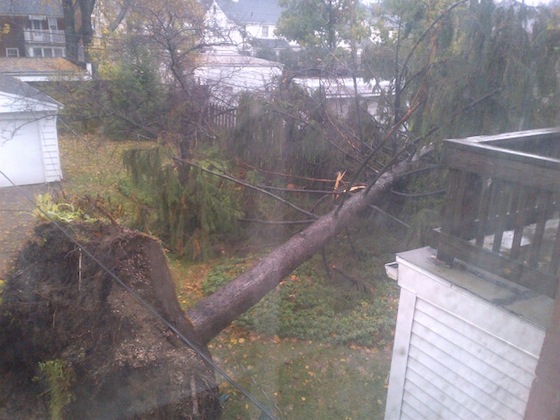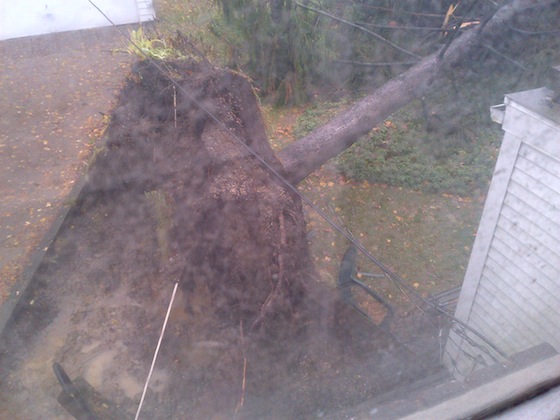Even though we were on the fringes of Hurricane Sandy, a massive pine tree in our backyard toppled over during the night, even though there was not much wind. We did not even hear it falling, suggesting that it fell over slowly rather than come crashing down, presumably because the cause was the soil being weakened by steady, but not heavy, rain rather than high wind. Fortunately it missed our house and garage and the neighbor’s house and garage and the main damage it caused was to the fence separating our two properties and to a smaller tree that was in its path.
Given the absence of high winds, I was interested in this article explaining why trees fall.
One thing I noticed was that for such a tall tree, the root system was quite shallow, spreading horizontally rather than going straight down. Hence when the ground became soggy with rain, it did not seem to take much for the root system to take the soil along with it. As you can see from the photos, the depth of the uprooted soil was less than a foot.



Well, that answers that question.
I also notice that it was growing along a driveway or something which prevented half of the root system from developing.
Unless it was planted and watered to encourage a deep taproot (assuming it’s a taprooted species, it had a stunted root system.
To be fair, this tree wasn’t in a forest.
We get a lot of this kind of thing here in western Oregon. Our major conifer species, the Douglas-fir, evolved to grow in thick stands where multiple trees block the wind load for each other. Then humans come in and take out 80% of the trees, build houses between the isolated remnants, and wonder why an 80-foot tree with a root ball the size of a Volkswagen Beetle falls over in the winter.
Your pine seems to have evolved for slightly different conditions, but still not ones that lead to developing a taproot.
So the mystery remains…
Be sure to click through to the SciAm article and read the comments! Trees, it turns out, fall because of chemtrails!
There’s a rather tall Doug Fir next to our house that was planted, almost on the property line, by a neighbor about 30 years ago. I continually regret not having gotten it out of there when the house was empty. The current owner recently refused my offer to pay for having it removed.
Not so long ago it was in a forest. Then one day the other trees went away and houses, stores and banks grew in the empty spaces but provided no wind break for the lonesome pine.
And so it goes . . .
Glad no one was hurt/ and there wasn’t severe damage.
A couple years back I got to witness two trees falling over on a camping trip (it was _really_ windy at the time, and both trunks snapped, no root-ball tipping).
I thought the first was going to fall on my tent, but the tree was only ~1/2 the height of the distance twixt us. weird, interesting, strangely beautiful, and (very)briefly scary thing to witness.
The second was a bit less impressive, but it’s hard to beat crawling out of a tent, yawning, and then wondering if something is going to fall on you.
It was mid-day, I was hiking, heard a loud ‘crack’, turned, watched one trunk among many tip over in the distance, and heard a ‘thwump’. still cool to witness, but couldn’t quite compare.
Not quite relevant, but as a kid, I was always fascinated by upturned rootballs (rootdiscs? lenses?…). just so much interesting stuff you normally don’t see, plus the whole curiosity about what caused it.
I lived for a while in the Santa Cruz Mountains. Lots of Doug firs and Redwoods (which also have shallow root systems.) Every winter a bunch of ’em would fall in the wind, playing havoc with the power lines. My personal record was 3 days without power (the worst part was having to listen to my neighbors’ generators day and night. I’d much rather be without power for a few days than have to listen to that awful noise for hours on end.)